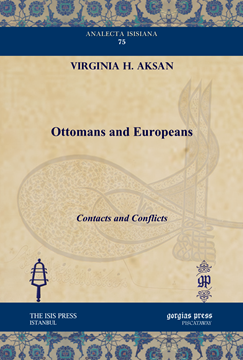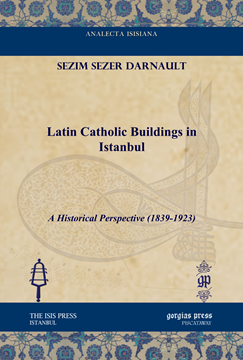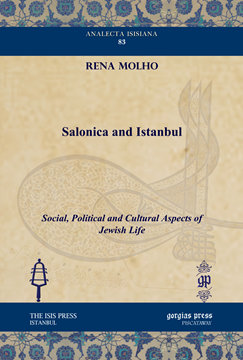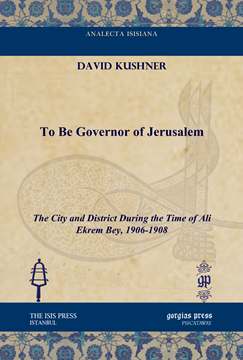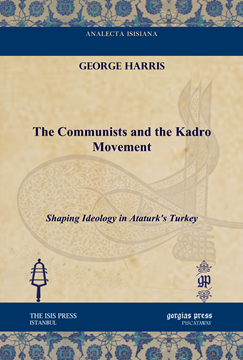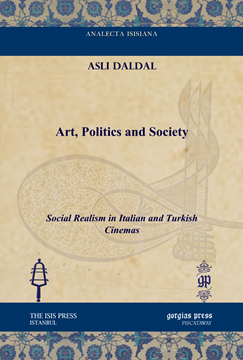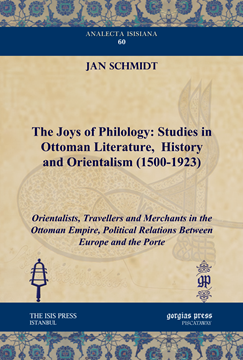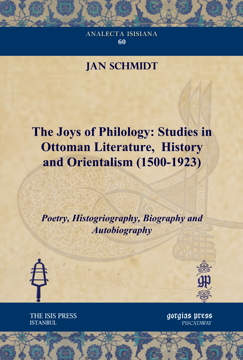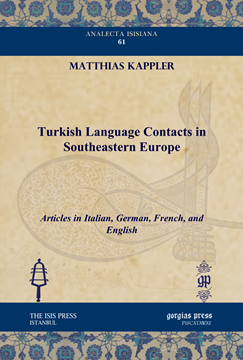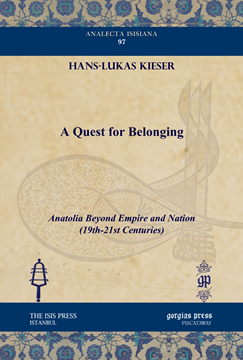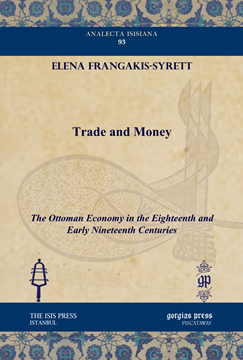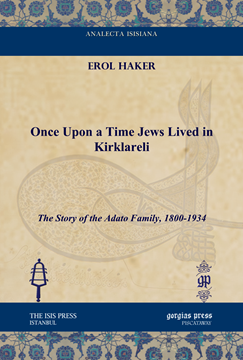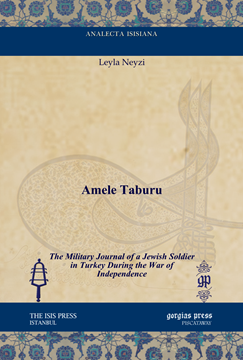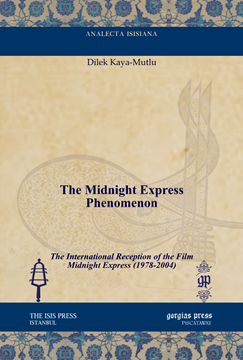Analecta Isisiana: Ottoman and Turkish Studies
A co-publication with The Isis Press, Istanbul, the series consists of collections of thematic essays focused on specific themes of Ottoman and Turkish studies. These scholarly volumes address important issues throughout Turkish history, offering in a single volume the accumulated insights of a single author over a career of research on the subject.
Social Practice and Political Culture in the Turkish Republic
ISBN:
978-1-61719-135-0
This volume collects the work of Michael E. Meeker on Turkish society. Meeker’s research is based on field work he conducted in rural Turkey in the 1960s and then in Istanbul in the 1980s. Meeker’s interest is in how Turkish social conventions imply structures of political authority. In Turkey, formal institutions and interpersonal association have a close relationship, something which dates back to Ottoman times. The first two sections are devoted to the Black Sea Turks in general and then the Black Sea district of Of. The third part is devoted to Meeker’s writings on an Islamic resurgence in Turkey. The fourth and final part contains articles on political authority and interpersonal relationships in Turkey, past and present.
$174.00 (USD)
I Kath'inas Anatoli
Studies in Ottoman Greek History
ISBN:
978-1-61719-134-3
I Kath’imas Anatoli is a collection of papers by Richard Clogg on the Greeks inhabiting Ottoman Anatolia.
$184.00 (USD)
Rumeli under the Ottomans, 15th-18th Centuries
Institutions and Communities
ISBN:
978-1-61719-133-6
Gradeva’s book is a collection of articles on the Ottoman Balkans which look at the administrative structures and inter-communal relations of the region.
$175.00 (USD)
The Idea of State in pre-Islamic Turkish Thought
By Ayhan Biçak
ISBN:
978-1-61719-131-2
Ayhan Biçak’s study of Turkic thought is constructed around understanding their pre-Islamic notions of the state.
$118.00 (USD)
Ottomans and Europeans
Contacts and Conflicts
ISBN:
978-1-61719-130-5
This collection of articles by Virginia Aksan explores the contacts and conflicts between Ottomans and Europeans through the centuries.
$148.00 (USD)
The Passage from the Ottoman Empire to the Nation-States
A Long and Difficult Process: The Greek Case
ISBN:
978-1-61719-129-9
This collection of papers describes the transition of the Ottoman Greek community into nation states (Greece and Cyprus). The author explores the relationship between the religious and the national in the Ottoman context.
$140.00 (USD)
British Policy towards Transcaucasia, 1917-1921
ISBN:
978-1-61719-128-2
This work studies British policy towards the Caucasus (Georgia, Armenia and Azerbaijan) as it developed at the end of the First World War in light of the Russian Revolution.
$148.00 (USD)
Latin Catholic Buildings in Istanbul
A Historical Perspective (1839-1923)
ISBN:
978-1-61719-127-5
This work is an architectural and historical survey of surviving and demolished Latin Catholic Churches in late-Ottoman Istanbul.
$181.00 (USD)
Salonica and Istanbul
Social, Political and Cultural Aspects of Jewish Life
By Rena Molho
ISBN:
978-1-61719-126-8
This collection of articles by Rena Molho addresses Salonica’s Jewish community during the nineteenth century and the first fifty years of the twentieth century, when the city was home to a large Jewish population.
$157.00 (USD)
To Be Governor of Jerusalem
The City and District During the Time of Ali Ekrem Bey, 1906-1908
ISBN:
978-1-61719-122-0
This volume is a collection of the private papers of Ali Ekrem Bey, the governor of Ottoman Jerusalem at the beginning of the twentieth century.
$144.00 (USD)
Strategies and Struggles
British Rhetoric and Turkish Response: The Lausanne Conference, 1922-1923
ISBN:
978-1-61719-120-6
Strategies and Struggles is the first full-length work on the diplomatic efforts of Britain and Turkey to secure their interests during the Lausanne Conference following the First Wold War.
$137.00 (USD)
The Communists and the Kadro Movement
Shaping Ideology in Ataturk's Turkey
ISBN:
978-1-61719-114-5
This work addresses the issue of underground Turkish Communism in the 1920s and 1930s. Harris explains the relationship between the Kemalists and Communists, including the break-away Kadro group, during this period.
$142.00 (USD)
Art, Politics and Society
Social Realism in Italian and Turkish Cinemas
By Asli Daldal
ISBN:
978-1-61719-112-1
Art, Politics and Society is Asli Daldal’s comparative analysis of Italian and Turkish cinema following periods of political upheaval, which she then uses to produce a theoretical framework.
$141.00 (USD)
Studies in Ottoman Literature, History and Orientalism (1500-1923)
Orientalists, Travellers and Merchants in the Ottoman Empire, Political Relations Between Europe and the Porte
By Jan Schmidt
ISBN:
978-1-61719-108-4
This is the second volume of Jan Schmidt’s collection of essays on Ottoman history, literature and historiography.
$222.00 (USD)
Studies in Ottoman Literature, History and Orientalism (1500-1923)
Poetry, Histogriography, Biography and Autobiography
By Jan Schmidt
ISBN:
978-1-61719-107-7
This is the first volume of Jan Schmidt’s collection of essays on Ottoman history, literature and historiography.
$154.00 (USD)
Turkish Language Contacts in Southeastern Europe
Articles in Italian, German, French, and English
ISBN:
978-1-61719-106-0
Matthias Kappler writes in this collection of essays on language contacts and multilingual spaces as they existed in Istanbul, the Balkans and Greece.
$155.00 (USD)
A Quest for Belonging
Anatolia Beyond Empire and Nation (19th-21st Centuries)
ISBN:
978-1-61719-103-9
A Quest for Belonging collects Hans-Lukas Kieser’s works on identities and nationalities in late-Ottoman Anatolia and how their destruction during the First World War continues to resonate today.
$206.00 (USD)
Trade and Money
The Ottoman Economy in the Eighteenth and Early Nineteenth Centuries
ISBN:
978-1-61719-102-2
Trade and Money is an economic history of the Ottoman world in the eighteenth, nineteenth and twentieth centuries.
$176.00 (USD)
Rethinking the Late Ottoman Empire
A Comparative Social and Political History of Albania and Yemen, 1878-1918
By Isa Blumi
ISBN:
978-1-61719-096-4
This collection of Isa Blumi’s essays comprises one historian’s attempts at understanding the late Ottoman Empire through a series of studies of Ottoman Albania and Yemen.
$136.00 (USD)
Once upon a Time Jews Lived in Kirklareli
The Story of the Adato Family, 1800-1934
By Erol Haker
ISBN:
978-1-61719-091-9
Erol Haker recounts the history of the Sephardic Jewish Adoto family, which originally hails from the town of Kirklareli. This is one of the few books to describe the Jewish population of Turkish Thrace.
$162.00 (USD)
Ottoman Studies and Archives in Greece
ISBN:
978-1-61719-090-2
Evangelia Balta, an expert on the Greeks in the Ottoman Empire, collects here her experiences in studying the Ottomans in Greece. She explores issues in historiography and archival research.
$118.00 (USD)
Arabs and Ottomans
A Checkered Relationship
ISBN:
978-1-61719-089-6
Arabs and Ottomans is an anthology of articles by Professor Caesar Farah on Ottoman Syria and Yemen in the nineteenth and twentieth centuries.
$219.00 (USD)
The Reports of the Last British Consul in Trabzon, 1949-1956
A Foreigner's Perspective on a Region in Transformation
ISBN:
978-1-61719-123-7
This collection of reports from the British consul responsible for north-eastern Anatolia offer a previously unavailable look at the development of the region during the 1950s.
$183.00 (USD)
Amele Taburu
The Military Journal of a Jewish Soldier in Turkey During the War of Independence
By Leyla Neyzi
ISBN:
978-1-61719-121-3
Amele Taburu is the French-language journal kept by Haim Akbukrek, a Jewish conscript in the Turkish nationalist army during the War of Independence in the 1920s.
$108.00 (USD)
The Midnight Express Phenomenon
The International Reception of the Film Midnight Express (1978-2004)
ISBN:
978-1-61719-119-0
This book studies the film The Midnight Express and analyses how it has negatively altered perceptions of Turkey until the present.
$123.00 (USD)





